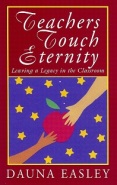I was talking with a wise friend a few days ago and I heard him say, “Life is all about big people helping little people become big people.” He didn’t take credit for the quote. He said he had heard it somewhere. But the simplicity and the truth of that statement has been resonating in me for several days. That one sentence defines teaching, parenting, mentoring, coaching, and a wide variety of other professions and important roles we play.
When I wrote my first book for teachers, I was working with a publisher who kept sending me book cover ideas seeking my approval. But none of the covers seemed to speak to the message the true classroom stories in the book conveyed. I was embarrassed to be taking up so much of their time, being picky. I sat down in a preschool classroom with preschool scissors and construction paper. I cut and pasted a design in 20 minutes sitting at chair and table suitable for a 4-year-old. I sent it off to the publisher with a note that said, “I’m seeing something more like this.” I’m not an artist of any kind. I expected them to take my hastily made sample and design something professional. But they made the front of the book by simply scanning my 20 minute design onto the cover and adding the title. At first I was embarrassed about it because I have no artistic skills. But then I realized it did convey a message. Why was it effective? Because it says, in simple graphic fashion almost exactly what my friend said to me. “Life is about big people helping little people become big people.” (Throw in an apple to make it teacher specific).
Yes, teachers teach academics. Yes, teachers work to raise test scores and reading comprehension. But too frequently the media and other outside critics forget one of the most important roles a teacher fills. We teach little people how to become big people. We teach about living life with character. We teach about ways to problem solve and adapt in times of change. We teach tolerance and acceptance. We teach little people how to use positive self talk to push them forward toward a dream when they are no longer in our classroom. We teach them about the rewards of utilizing initiative and perseverance and also the consequences of procrastination.
Of course the real truth is that the words big and little are relative. Some people who are big have much to learn from little people. I have learned some of my life’s most important lessons from my students. Some of the ones who have struggled the most with academics have taught me the most about teaching. They taught me that until I can explain something in a way that they can understand it, I am not teaching. Others with behavior challenges have taught me to continually hone my skills of patience. I can de-escalate the hairyiest of situations. Still others have been happy to point out my shortcomings, not always inaccurately. They helped me learn some uncomfortable truths about myself. Usually it is the littlest ones who best understand both enthusiasm and tolerance. Little ones have taught me the most about unqualified acceptance and the simple joys of living. My teens remind me to continue to fight injustices. They possess the optimism of youth. They believe they can change unfair things so they go out and fight battles I have long ago given up as impossible. One time, with zero encouragement from me, a group of them took on an impossible battle on my (and their) behalf. And they won. I’ll never forget it.
Life IS about big people, helping little people become big people. And vice versa. We are all in this together. It works best when we use one another to learn life’s most important lessons. But using test scores as the only measurement of success for the teaching profession is like writing a fairy tale and only saying, “Once upon a time…” and stopping there.
Let’s get clear about this. Test scores alone will not make our students live happily ever after.
TEACH…To Change Lives
Available in large quantities from the author: dauna@cinci.rr.com
Also available at Amazon.com
Contact Dauna Easley to speak to your group: dauna@cinci.rr.com






























